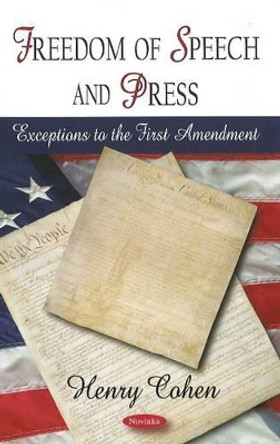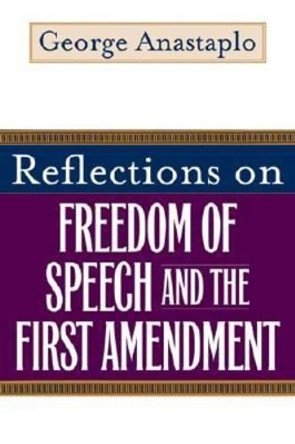Description
About the Author
Wendell Bird is the author of Press and Speech under Assault: The Early Supreme Court Justices, the Sedition Act of 1798, and the Campaign against Dissent (2016); and of Criminal Dissent: Prosecutions under the Alien and Sedition Acts of 1798 (2020). He earned a D.Phil. degree in legal history from University of Oxford, and a J.D. degree from Yale Law School. He is a Visiting Scholar at Emory University School of Law.
Reviews
Wendell Bird's extraordinary books on the history of the Sedition Act make clear how ... [a]rguments against the Blackstonian understanding of freedom of speech and freedom of the press were part of creating a republican government rooted in individual rights and popular sovereignty--a government that provided for robust political dissent and a loyal opposition .... * George Thomas, Burnet C. Wohlford Professor of American Political Institutions, Claremont McKenna College, author of The (Un)Written Constitution and of The Founders and the Idea of National University *
Recent exhaustive scholarship has dispelled the prior consensus that Blackstone's view of freedom of the press was the prevailing one in the early United States * Matthew L. Schafer, adjunct professor of media law, Fordham University School of Law *
The Revolution in Freedoms of Press and Speech is itself revolutionary. The conventional historical view - defended most prominently by Leonard Levy - has been that as widely understood at the time the First Amendment was proposed and ratified, the freedoms of press and speech were quite narrow. But as Wendell Bird demonstrates in his magisterial new book, that view is utterly mistaken. As widely understood not only at the time the First Amendment was proposed and ratified but also for a generation before then, the freedoms of press and speech were significantly broader than Levy and many others have argued. Bird's book is a truly indispensable contribution to the ongoing debate about the original understanding of the First Amendment. * Michael J. Perry, Robert W. Woodruff Professor of Law, Emory Law School, author of Human Rights in the Constitutional Law of the United States and of A Global Political Morality: Human Rights, Democracy, and Constitutionalism *
One of the most successful attacks on constitutional freedoms of press and speech has been the claim by some influential historians that those freedoms meant very little - were seen as very narrow - when the First Amendment was written and ratified. This book demolishes that too-dominant historical myth, documenting hundreds of counter examples from the late eighteenth century. It shows that our freedoms of press and speech were designed as powerful protections to repudiate, not replicate, inadequate English rights. * Nadine Strossen, former President of the ACLU, New York Law School, author of HATE: Why We Should Resist It with Free Speech, Not Censorship *
The Revolution in Freedoms of Press and Speech... is a nuanced yet brave book--Ralph Waldo Emerson's much-repeated admonition that 'when you strike at a king, you must kill him' comes to mind... In his meticulous accounts of the historical record, Bird... convincingly argues that Blackstone's definition of what English law had historically protected was far too narrow and had not been widely accepted in that country. * Floyd Abrams, First Amendment News *
the rich reservoir of original research in this book warrants the belief that it may well mark a new day in our current understanding of the speech and press clauses of the First Amendment. * Ronald K. L. Collins, Editor of First Amendment News *
This is a definitive account of the meaning of free press and free speech leading up to the framing of the First Amendment. Bird shows that in the eighteenth century, in both England and America, those freedoms were understood to be expansive and robust. Others have made that assertion, but Bird is the first to thoroughly document it. His work should finally lay to rest the revisionist claim that the framers meant only to forbid prior restraints. * David A. Anderson, University of Texas School of Law, author of Mass Media Law *
Wendell Bird's meticulously researched book The Revolution in Freedoms of Press and Speech: From Blackstone to the First Amendment and Fox's Libel Act confronts [Leonard] Levy on many points. Bird shows that Americans living in the decades before 1798 typically rejected seditious libel and adhered to broad understandings of their rights to express themselves. * Jeffery A. Smith, University of Wisconsin, Milwaukee, Communication Law and Policy *
The title of legal historian Wendell Bird's book The Revolution in Freedoms of Press and Speech refers to a dramatic change in the dominant understanding of press freedom in Britain and the United States. By the mid-1760s, Bird shows through a painstaking examination of previously ignored material, the majority position--the one that would be reflected by the First Amendment--was that people had a right to criticize the government without going to jail for it. That "contradicts the prevailing academic view, which says ... freedom of the press meant only freedom from prior restraint, not freedom from punishment if what you printed happened to offend powerful people. In Bird's persuasive retelling, ... the eminent British jurists William Blackstone and Lord Chief Justice Mansfield ... presented as settled law what was by then an outdated, minority position. * Jacob Sullum, senior editor at Reason *
So you think the Founding Fathers believed that press freedom should be restrained by the threat of prosecution for seditious libel? This splendidly researched and forcefully argued book demonstrates that, on the contrary, the overwhelming body of educated opinion in both Britain and America was convinced by the controversies of the 1760s that a healthy body politic required almost unrestricted public comment on politics. Blackstone and Mansfield created the counter weapon ... to restrain political opposition. * Donald Ratcliffe, Senior Research Fellow, Rothermere American Institute, University of Oxford, author of The One-Party Presidential Contest *
Historians have long disagreed about eighteenth-century understandings of freedom of expression. Anyone interested in the formation of the Constitution's press and speech rights should read Wendell Bird's eye-opening work ... Extensive research leads to convincing conclusions about the creation of essential democratic freedoms. Rarely does a book do so much to correct and enhance historical study of a momentous topic. * Jeffery A. Smith, Professor Emeritus, University of Wisconsin-Milwaukee, author of Printers and Press Freedom and of Franklin and Bache *
Book Information
ISBN 9780197509197
Author Wendell Bird
Format Hardback
Page Count 408
Imprint Oxford University Press Inc
Publisher Oxford University Press Inc
Weight(grams) 703g
Dimensions(mm) 160mm * 239mm * 36mm










